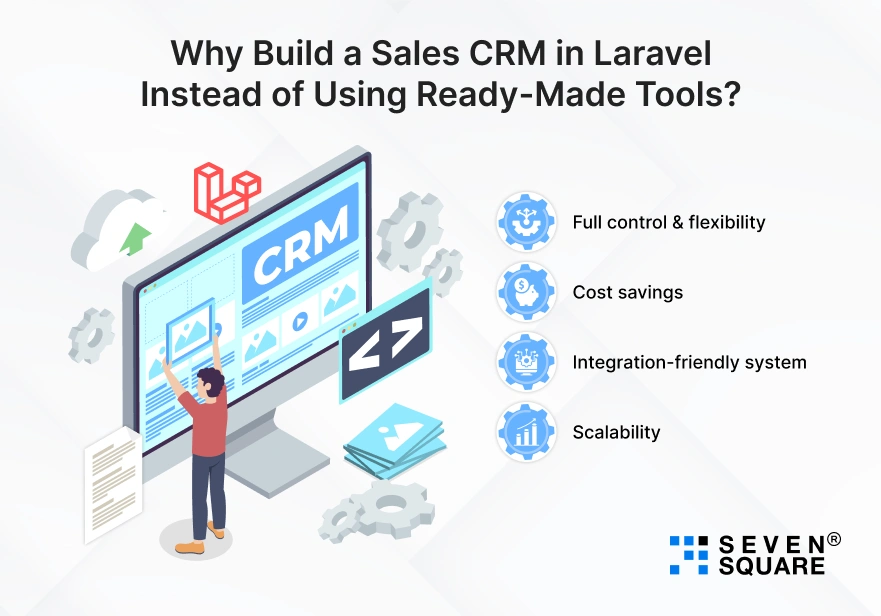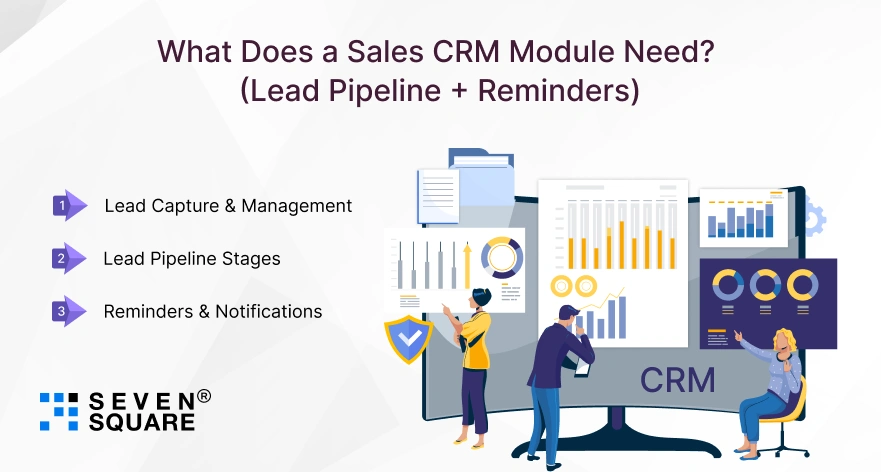Are you wondering if it’s really possible to build a Sales CRM Module in Laravel that includes a lead pipeline and reminder system?
The answer is yes, and you don’t need to rely on expensive third-party CRMs to get started.
By using Laravel CRM development, you can create a fully customized sales CRM in Laravel that fits your business needs perfectly.
In this competitive market, businesses need more than just a contact list.
They need a smart lead management system in Laravel that can track opportunities, move leads through pipeline stages, and send timely reminders so no deal is missed.
That’s exactly what a Laravel sales CRM module can deliver: flexibility, scalability, and cost savings compared to off-the-shelf SaaS tools.
If you are trying to look for a cost-effective CRM or want full control over your sales process, this blog will show you how to create a production-ready Sales CRM in Laravel.
Why Build a Sales CRM in Laravel Instead of Using Ready-Made Tools?

Most businesses start with popular SaaS CRMs, but soon learn about hidden costs: expensive subscriptions, feature limitations, and a lack of control.
A ready-made tool may look attractive at first, but scaling often becomes costly.
By building a Sales CRM in Laravel, you get:
- Full control & flexibility: Add or remove features as your business grows.
- Cost savings: Pay once for development, not endless subscription fees.
- Integration-friendly system: Laravel works smoothly with APIs, third-party tools, and custom modules.
- Scalability: From small teams to large enterprises, a Laravel CRM adapts easily.
Laravel’s ecosystem provides a clean code structure, built-in tools for notifications, and an active community.
For businesses, this means a customizable CRM solution that matches your unique sales process.
Learn to Create Inventory Management System with Batches & Barcode in Laravel.
What Does a Sales CRM Module Need? (Lead Pipeline + Reminders)

Every sales CRM module in Laravel must go beyond just storing contacts. To actually help sales teams, it needs three core features:
- Lead Capture & Management: Store potential customer details, track progress, and assign leads to team members. This is the foundation of Laravel lead management.
- Lead Pipeline Stages: Visualize how leads move through different stages (new, contacted, proposal, won, lost). This step-by-step Laravel lead pipeline helps teams stay organized.
- Reminders & Notifications: Sales teams often lose deals because of missed follow-ups. A simple reminder system in Laravel (using notifications + scheduling) ensures no opportunity is forgotten.
When combined, these features make a powerful sales CRM module Laravel tutorial project that doesn’t just manage contacts but actively drives sales.
Explore the Top 10 Laravel Packages.
Step 1: Setting Up Laravel for a CRM Project
Before we start coding the Sales CRM in Laravel, we need a fresh Laravel project. This will serve as the foundation for our Laravel CRM module tutorial.
1. Install Laravel & Dependencies
Make sure you have PHP, Composer, and MySQL/Postgres installed. Then run:
composer create-project laravel/laravel laravel-crm
cd laravel-crm
php artisan serve
Laravel is now installed. You can visit http://127.0.0.1:8000 to see it running.
2. Database Setup for Leads & Pipeline Tables
Open the .env file and configure your database:
DB_CONNECTION=mysql
DB_HOST=127.0.0.1
DB_PORT=3306
DB_DATABASE=laravel_crm
DB_USERNAME=root
DB_PASSWORD=
Run migrations to test everything works:
php artisan migrate
Now we’re ready to build CRM in Laravel with leads, pipelines, and reminders.
Step 2: How to Build the Lead Pipeline in Laravel (With Code)
The heart of any lead management system in Laravel is the pipeline. Let’s create migrations and models.
1. Create Leads & Pipeline Migrations
Run:
php artisan make:model Lead -m
php artisan make:model PipelineStage -m
In database/migrations/xxxx_create_leads_table.php:
public function up()
{
Schema::create('leads', function (Blueprint $table) {
$table->id();
$table->string('name');
$table->string('email')->unique();
$table->string('phone')->nullable();
$table->foreignId('pipeline_stage_id')->constrained();
$table->timestamps();
});
}
In database/migrations/xxxx_create_pipeline_stages_table.php:
public function up()
{
Schema::create('pipeline_stages', function (Blueprint $table) {
$table->id();
$table->string('name'); // e.g., New, Contacted, Proposal, Closed
$table->timestamps();
});
}
2. Define Eloquent Relationships
In app/Models/Lead.php:
class Lead extends Model
{
protected $fillable = ['name', 'email', 'phone', 'pipeline_stage_id'];
public function stage()
{
return $this->belongsTo(PipelineStage::class, 'pipeline_stage_id');
}
}
In app/Models/PipelineStage.php:
class PipelineStage extends Model
{
protected $fillable = ['name'];
public function leads()
{
return $this->hasMany(Lead::class);
}
}
Run migrations:
php artisan migrate
Now you have a working Laravel lead pipeline example with code.
Step 3: Adding a Reminder & Notification System for Leads
Missed follow-ups = missed sales. Let’s add a Laravel reminders system with notifications + cron jobs.
1. Create Reminder Migration & Model
php artisan make:model Reminder –m
In xxxx_create_reminders_table.php:
public function up()
{
Schema::create('reminders', function (Blueprint $table) {
$table->id();
$table->foreignId('lead_id')->constrained();
$table->string('message');
$table->timestamp('remind_at');
$table->boolean('is_sent')->default(false);
$table->timestamps();
});
}
2. Create Notification
php artisan make:notification LeadReminderNotification
In app/Notifications/LeadReminderNotification.php:
class LeadReminderNotification extends Notification implements ShouldQueue
{
use Queueable;
private $reminder;
public function __construct($reminder)
{
$this->reminder = $reminder;
}
public function via($notifiable)
{
return ['mail', 'database'];
}
public function toMail($notifiable)
{
return (new MailMessage)
->line("Reminder: {$this->reminder->message}")
->line('Lead: ' . $this->reminder->lead->name)
->line('Follow-up time: ' . $this->reminder->remind_at);
}
}
3. Schedule Cron for Sending Reminders
Open app/Console/Kernel.php:
protected function schedule(Schedule $schedule)
{
$schedule->call(function () {
$reminders = Reminder::where('remind_at', '<=', now())
->where('is_sent', false)->get();
foreach ($reminders as $reminder) {
$reminder->lead->notify(new LeadReminderNotification($reminder));
$reminder->update(['is_sent' => true]);
}
})->everyMinute(); // check every minute
}
Run scheduler:
php artisan schedule:work
You now have Laravel notifications + scheduling cron in Laravel for automated reminders.
Step 4: User-Friendly Lead Management in Laravel CRM
A CRM is not just backend code; you need a simple UI for managing leads. You can use Laravel Livewire CRM, Nova, or Backpack to speed this up.
Example Features:
- Forms for Adding Leads (name, email, phone, pipeline stage)
- Assigning Leads to Sales Reps (foreign key user_id)
- Drag-and-Drop Pipeline (optional via Livewire/Vue.js)
Example: Basic Lead Controller
class LeadController extends Controller
{
public function index()
{
$leads = Lead::with('stage')->get();
return view('leads.index', compact('leads'));
}
public function store(Request $request)
{
Lead::create($request->all());
return redirect()->back()->with('success', 'Lead created!');
}
public function move(Request $request, Lead $lead)
{
$lead->update(['pipeline_stage_id' => $request->stage_id]);
return redirect()->back()->with('success', 'Lead moved to new stage!');
}
}
With Laravel’s lead management features like this, sales reps can quickly move leads across pipeline stages and stay organized.
Here you can see the Complete GitHub Code to Create a Sales CRM Module with Lead Pipeline & Reminders in Laravel.
How Seven Square Helps You Build the Best Laravel CRM Module?
We understand that building a Sales CRM in Laravel is about creating a powerful tool that helps businesses manage leads, pipelines, and reminders effectively.
Our team has deep expertise in Laravel CRM module development, ensuring every project is built with scalability, performance, and usability in mind.
- We have hands-on experience in building custom Laravel CRM modules, including lead pipelines, reminders, and notifications.
- From setting up the database to integrating GitHub-ready code, we handle the full process of building CRM in Laravel.
- We design smart lead management systems in Laravel with pipeline stages, assignment features, and automated follow-ups.
- We implement Laravel reminders systems, Laravel notifications, and cron scheduling to make sure no sales lead is ever missed.
- Our team uses Laravel Livewire CRM, Nova, or Backpack to create intuitive dashboards for sales teams.
Want to build a Sales CRM in Laravel? Contact Us Today!
Is a Laravel CRM Worth It?
The decision comes down to flexibility.
Off-the-shelf CRMs are fast to start with, but they often limit customization and become costly over time.
Building a Sales CRM in Laravel with a lead pipeline and reminders gives you control, scalability, and freedom to design a system that matches your sales workflow.
Plus, with open-source code and Laravel’s robust ecosystem, it’s easier than ever to create a professional CRM.
This tutorial (with GitHub code) is designed to help you take the first step. Clone the repo, test it locally, and then start customizing.
FAQs
- Yes. Laravel provides everything you need: authentication, database management, notifications, and API support to build a fully functional Sales CRM in Laravel.
- You can use Laravel Notifications (email, SMS, in-app) along with task scheduling to build an automated reminder system in Laravel for lead follow-ups.
- Define pipeline stages in the database, link them with leads using eloquent relationships, & create a simple UI to move leads across stages. This forms the backbone of laravel lead pipeline functionality.
- Ready-made CRMs have hidden costs. A Laravel Sales CRM offers flexibility, scalability, and complete control, making it ideal for businesses seeking custom lead management and reminder systems.